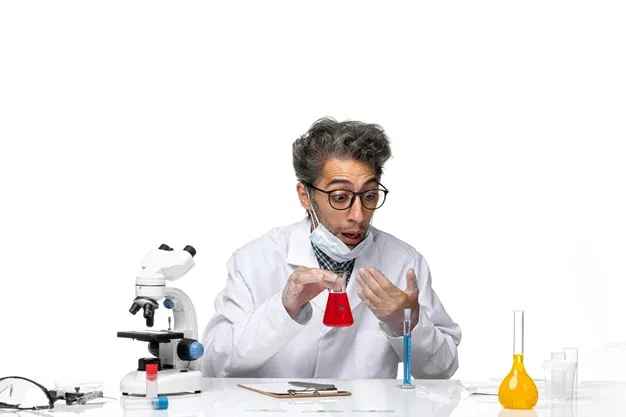How to Become a Scientist
Updated: 3 December 2024, 1:52 pm IST
A career as a scientist is an extremely fulfilling and rewarding profession. If you want to become a scientist, you must research well about the specific area of science that interests you so that you can take up a career in that direction. As a scientist one needs to research extensively, develop new technologies, and conduct several trials and experiments in the laboratory, among other crucial roles.
Becoming a scientist is interesting, however, many of you might ponder on one important question - How to become a scientist? In this post, let us discuss the process to help students who are willing to take up this profession.

What roles are performed by scientists?
Below are some functions performed by scientists:
- Scientists conduct experiments and do research
- They write research papers and publish them
- They collect samples and conduct fieldwork
- They carry out experiments and analyze data
- They train and supervise subordinates and junior scientists
- They stay updated with different fields of scientific research
Steps to Follow to Become a Scientist
Aspiring students who want to become scientists can follow the right path to fulfill their dream. Here are the steps to follow:
1. Complete 10+2 in the science stream:
To become a scientist after 12th, one must complete their 10+2 in the science stream with a minimum of 50% aggregate marks with PCM or PCB as the main subjects.
2. Obtain a bachelor’s degree:
Once they complete their 10+2, students must enroll themselves for a bachelor’s degree with a specialization in any specific field of their choice, including biology, chemistry, physics, computer science, biotechnology, botany, zoology, etc. Students may also pursue their bachelor's in engineering with a desired specialization.
3. Complete a master’s degree:
After completing the bachelor’s program, enroll in a master’s degree course in your relevant field of specialization. Alternatively, you may enroll in integrated courses that combine UG and PG degrees within one program.
4. Pursue a Phd:
Most students who are willing to become scientists like to pursue a Ph.D after their master's program. This further enhances knowledge and the prospects of job opportunities for them.
5. Acquire experience:
The next step is to acquire experience. This can be done either through internship programs under able scientists or research centers. Also, candidates can publish research papers and present research work on national and international scientific platforms. Students may also find a mentor to guide them through the path to becoming a successful scientist in their respective field of study.
6. Consider certification to keep learning:
Keep learning new things and updating yourself with the latest developments in the field of scientific research. Being a scientist requires candidates to keep abreast with the latest that is happening in their area of interest. Candidates can take up certifications, attend seminars and conferences, and interact with peers to stay updated.
Read this blog:- Data Scientist Salary In India
What Skills are Required to Become a Scientist?
Here are some skills that are required to possess by candidates who want to become scientists:
· Critical thinking – Critical thinking is a pivotal skill that scientists must have to determine the best methods to unfold scientific solutions. With good critical thinking skills, scientists can speed up work and prevent errors.
· Communication – Like any other field, scientists are required to have good command over language for both written and verbal communication. They also require these skills to pursue their research work and for good career prospects.
· Interpersonal skills - Interpersonal skills are also required for scientists to develop strong professional relationships with colleagues and to ensure good teamwork for individual and organizational success.
· Attention to detail – This is another critical skill for scientists. They are required to record information accurately, especially while handling large data and a variety of tasks together. Hence, they must possess strong attention to detail skills to avoid missing any crucial detail.
Call Us For Any Query:- 1800 102 3434
What are the different fields to Choose by Scientists?
Scientists play a crucial role in the growth and development of a nation. They work across different disciplines. Below are some disciplines or job roles that aspirants can seek to pursue as scientists.
· Physicists – Physicists are scientists who study physics and its branches such as applied and quantum physics, engineering physics, and so on. They perform research on both theoretical and experimental aspects.
· Astronomers – Astronomers study the universe and celestial bodies such as stars, planets, and galaxies. They specialize in different disciplines like physical cosmology, astronomy, astrobiology, and planetary sciences.
· Microbiologists – Microbiologists are scientists who study microorganisms that can’t be seen through the naked eye. These scientists specialize in the research of bacteria, viruses, and other microbes and their interaction with human environments. For example, pathogens and their interactions with humans are studied by pathologists.
· Biologists – Plants, animals, microbes, and other living organisms are fields of study for biologists. They also study the life processes of these living organisms, their functions, and their interactions. Marine biology, ecology, and genetics are some areas within biology that aspirants can specialize in.
Summing Up
To become a scientist may be challenging and you might face hurdles and uncertainties in your way to reach your destination. However, the rewards that you receive at the end of your journey in the form of a fulfilling career make the efforts worthwhile. If you are looking at the best way to pursue your dream of becoming a scientist, the first step to start with is to enroll in your preferred bachelor's course with a specialization in a specific subject of your choice.
Amity Online University is the best online educational institution that offers numerous online courses for aspiring scientists to pursue and reach their destination of becoming a scientist. To learn more about these courses and to enroll, visit Amity online.
Check Out Our Top Online Degree Programs
Tags : Latest
Explore similar programmes
frequently asked questions
What educational background do I need to become a scientist?
+To become a scientist, aspirants are required to obtain an undergraduate degree in science from a recognized college with relevant subjects like physics, chemistry, biology, and mathematics as per their chosen field of science.
What skills are important for a career in science?
+Specific technical skills, skills in research, teamwork, collaboration, mentoring, project management, data management, problem-solving, adaptability, communication, critical thinking as well as regulatory knowledge are some skills required for a career in science.
How do I gain experience in the field of science?
+To gain experience in the field of science, you can work under the guidance of a scientist as an intern or in a full-time job. There are many opportunities available in both public and private firms where you can work and gain expertise.
Are there specific certifications or licenses required to become a scientist?
+It depends on the specific field of science you want to pursue. For some fields like clinical research scientists, candidates might require particular certifications to carry on medical research.
How important is it to pursue a graduate degree for a scientific career?
+A bachelor’s degree helps you to concentrate on a particular field of study within science that you want to make a career in. This helps candidates to become more competitive.
What types of scientists are there, and how do I choose a specialization?
+There is a wide selection of specializations to choose from for aspirants to obtain a scientist degree. They can specialize in computer science, physics, astronomy, botany, microbiology, and forensic science, among others.
How can I stay updated with developments in my scientific field?
+Staying updated with developments in any scientific field is important. To keep yourself updated in your field of scientific research, you can continue learning through online courses, participate in webinars and virtual events, read research papers and journals, follow scientists on social media, subscribe to newsletters and podcasts, and so on.

